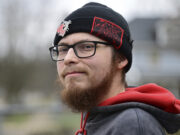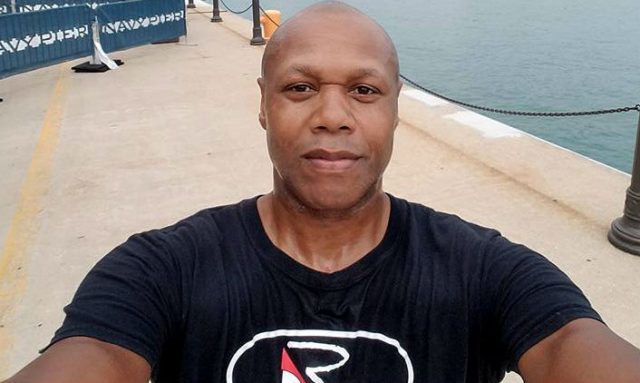Trent Jackson wants to make one thing perfectly clear: these weren’t Madison people.
One of the two men who launched an unprovoked, racially motivated attack on Jackson late one December night — an attack laced with racial slurs on obscenities — had just moved to Madison from Indiana six months earlier. The other man was only in town for the weekend from Indiana, as was the woman who Jackson says stood by and laughed.
“Neither of them grew up within our community, where you could say that our community, in some way, encouraged or fostered this sort of behavior,” Jackson says.
The attack itself was over pretty quickly, but the police investigation took many hours and the court system several weeks. When all was said and done, police let Jordan Volz, 30, walk, and recommended Austin Bossaer, 23, be charged with a hate crime.
But District Attorney Ismael Ozanne felt the case was appropriate for Community Restorative Court (CRC), meaning Bossaer could resolve the case with no criminal record. Ozanne confirms it was the first hate crime case recommended for the CRC. Jackson agreed to allow the case to go through CRC, but now says he was not given all the relevant information before making the decision.
What Happened
Both the police report and Jackson’s written account of the attack, which he provided to Madison365, read like a scene from Mississippi Burning, or the opening scene from Get Out.
It was well after dark when he took his chihuahua / rat terrier mix, Sergio, out for a walk in his near-west side neighborhood around 10 pm on Friday, December 22. When he was just 300 feet from his front door, a Jeep pulled up along the side of the road and a man yelled from the back seat, “F**k you, n****r, and your little Chihuahua dog.” Jackson ignored it and kept walking, as he says he often does when he hears people yelling slurs and insults.
“Throughout my life, someone drives by while I’m jogging (and says), “get out the road, n****r,’” he says. “And, that’s okay. You can say that because I’m comfortable enough and have enough confidence in myself to know that, that doesn’t bother me. But, you do not get to say that and then try to hurt me, physically hurt me.”
But that’s exactly what happened next.

Jackson says he heard a car door open and close, and he says the man — later identified as Bossaer — approached him while continuing to spit slurs and obscenities. Jackson, a 6’1” former Badger basketball player, says he tried to talk Bossaer out of starting something. Jackson turned to keep Bossaer in his sights, but kept walking backwards to keep his distance.
“Look, man, you have obviously been drinking. Don’t start anything. I could break you down and toss you up into those woods,” Jackson recalls saying. Jackson says Bossaer didn’t take the warning, and gave Jackson a shove in the chest. Jackson took a swing in self-defense but it didn’t land.
That’s when Jackson says the drivers’ side door opened and a larger man — Volz — emerged and rushed at him “like a football linebacker.” Jackson took another swing in self defense, this one landing squarely in Volz’s face. Jackson and Volz both hit the ground, Volz with a bloody and broken nose. Jackson says Volz was obviously intoxicated.
Jackson scrambled to his feet, still unsure just how many people were in the car. He and Bossaer both called 911.
Later, police allowed Marshall to drive Bossaer and Volz to Meriter hospital, because she had not been drinking. Both Bossaer and Volz told police that Bossaer had just gotten out of the car to talk to Jackson about his dog, and that Jackson had attacked him.
Police didn’t buy that.
Three officers spoke with Jackson around 12:40 am and determined he acted in self defense, and that Bossaer should be charged with disorderly conduct with a hate crime enhancer due to his use of racial slurs.
Volz would not be arrested or charged, police told Jackson, because he had already received “swift justice” from Jackson’s right hook.
That still doesn’t sit right with Jackson. As a victim, it’s not his job to mete out justice, he says.
“I didn’t go to law school, I don’t sit on the bar, I didn’t take the bar exam,” he says. “I am no judge and no jury to issue swift justice to anyone. I was defending myself.”

Madison police, though, felt that Jackson’s punch to the face was enough punishment for Volz, who was arrested for driving drunk in Indiana just eight days later, according to Indiana court records.
“Madison let this guy go and who knows, he could’ve hit and killed somebody,” Jackson says.
That’s not the only issue Jackson identifies with the way Madison police handled the situation. According to the police report, when they arrested Bossaer, police found a pocket knife on him — a key detail that Jackson says he didn’t know until six weeks later.
Still Loves Madison
Trent Jackson grew up in Chicago and moved to the suburb of Bolingbrook for high school, where they still say he was the best baller ever to play for the Raiders. (His number 32 was retired in 2013.) He came to play for the Badgers in 1985 and fell in love with his new hometown.
“It felt like it was a safe, great town,” he says. “A lot safer than what I had grown up in.”

After graduating, he played professionally in Europe in Asia, eventually returning to Madison in 1998. He brought the Boys and Girls Clubs to Dane County and served as the local Club’s first CEO until 2001. He returned to UW to earn his MBA and later founded the nonprofit ROUGH Foundation to fund nonprofits that help people and communities, and ROUGH Sportswear to fund the foundation.
Now 51, he also serves as Senior Director of Development for the Division of Diversity, Equity, and Educational Achievement, a Chancellor’s initiative, at the UW Foundation.
He’s raised two children in Madison and says this incident makes him love his adopted hometown even more.
“If anything, it strengthened my love for Madison. It absolutely still feels like a safe place to live,” he says. “It’s a great place to raise a family. It’s a very liberal town. You can tell the people are friendly.”
He does recognize, however, that he might be treated a bit better than some others — after all, in Madison, once a Badger, you’re always beloved.
“You got to give me a little handicap here, if you’re talking in a golf term,” he says. “I played a sport here. People remember me, they remember my name, so I get a little bit of a handicap here.”
Was Justice Served?
Dane County’s Community Restorative Court was established in 2015 in order to keep young people who make youthful mistakes out of the criminal justice system.
The idea, proponents said at the time, was that offenders would have to face their victims, make amends, and take responsibility for their actions in front of a circle of community members trained as Peacemakers. In return, the crimes would not go on their records and their names would stay out of CCAP, the online court records system, so that youthful mistakes wouldn’t necessarily follow them throughout their lives and make it difficult to get jobs.
First piloted on Madison’s South Side, the program is expanding county wide, as more community Peacemakers are trained in neighborhoods and communities across the county. In its first two years, the CRC took on 66 cases and successfully resolved all but three, County officials say.
To qualify for CRC, the perpetrator must be between 17 and 25 years of age and the victim must agree to allow the case to go through CRC. Police have discretion to refer any misdemeanor perpetrated by young offenders directly to the CRC; District Attorney Ismael Ozanne refers some others. Ozanne says his office has referred 38 cases to date, with another 15 currently under review.
Overall, it’s been working well, says Ozanne.
“I would say that the participants that seem to have gone through it have benefited,” Ozanne says. “The peacemakers who have participated have found it, I would say, very powerful. I think so far, you know as far as you can say, the program is successful and appears to be moving in the right direction.”
Ozanne could not comment on Jackson’s case because Bossaer has not yet completed the community service portion of his CRC program, so the case is technically still open. But he did confirm that this case is the first labeled as a hate crime that he’s referred to CRC.
Ozanne says the police noting a hate crime enhancer doesn’t necessarily mean a hate crime was committed. And prosecuting Bossaer might not have worked out well.
“The traditional criminal justice system, frankly, will allow people to go through it without ever accepting responsibility,” he says. “Without ever addressing a victim in a manner that basically gives power or grievance to the victim’s point of view. Because you can go through the criminal justice system, even through a trial, and sit there and say, ‘I didn’t do this. I’m not accepting responsibility.’ A jury could tell you that we believe you are guilty beyond a reasonable doubt and you still have never accepted responsibility.”
Brett Taylor, a national expert on restorative justice from the Center for Court Innovation who helped establish Dane County’s CRC, says the traditional justice system will only focus on what happened.
“The CRC would first of all be more difficult on these defendants (if they truly engage in the process in a sincere, meaningful way) as it will focus on the WHY this happened,” Taylor said in an email to Madison365. “They will have to answer to community people as to what they did and decisions they made. Simply put, they will have to confront their ugly, bigoted behavior. I’m also guessing this may be the first time they ever will have sat in a room with a black person(s) where there is meaningful dialog and they will ultimately see that they all have more in common than they do differences. I think this process has the potential to be a life-altering experience and could hopefully change the attitudes of these two people regarding their behavior towards people who look and act different than them.”
Ozanne also notes that Jackson had to approve going to CRC, which Jackson says he did only after someone from the DA’s office “strongly encouraged” him to do so.
“I was strongly encouraged to go with (CRC) because … the chances are, he might not get charged with a criminal offense anyway, being that this is his first time doing this,” Jackson says. Jackson says he was told that Bossaer, as a college graduate with a job and no criminal record, would have just gotten a “slap on the wrist” in traditional court.
But Jackson says no one told him Bossaer was carrying a knife at the time of the attack. He only learned that by reading the police report six weeks later. Had he known that, he wouldn’t have agreed to CRC, he says now.
“I think that should’ve changed the game plan of everything because if they get me on the ground, who knows what happens,” he says. “(Knowing about the knife) would have definitely changed my position (on community court).”
But, without that information about the knife, Jackson said yes to community court, and it ultimately worked out.
“My wife and I, Cathy, we both had a chance to ask him the questions that we wanted to ask him,” he says. “It was a good hour and 15 minute time period that we had with him. I mean, we went deep. It was very difficult, very challenging for him. He cried and expressed himself. I thought he expressed himself well. He said that he was sorry and felt a deep remorse for what he’s done.”
Jackson says Bossaer’s restorative court program requires him to write a number of essays, take part in an alcohol abuse program and perform community service, which has had a positive effect, he says.
“I forgive him,” Jackson says. “He said that, living in the neighborhood, if he sees me, he would want to come up to me and say hi, and I wouldn’t mind that. That doesn’t bother me.”
What still bothers Jackson, though, is that Volz and Marshall have not been held accountable. As a 30-year-old man, Volz would not have qualified for restorative court, and should have been arrested at least for drunk driving in Madison, Jackson believes.
“The challenge I have right now is that, the person who was charged has admitted to calling me the N-word and all the things that the police report said. He’s admitted to it,” Jackson says. “What bothers me most is the other guy that attacked me, who tried to assault me, who I punched in the nose, is saying that I should’ve been arrested. That’s what bothers me most about this. It’s just that, I guess I needed to be beaten up or roughed up in order for this to be taken more serious. And, I’m glad I didn’t give them a chance to do that to me, and hopefully, they don’t repeat this.”
Should hate crimes be excluded from CRC?
Both District Attorney Ozanne and Taylor, the national restorative justice advocate, say hate crimes should not be excluded from restorative court — and perhaps perpetrators could really learn from the process.
But it’s a policy question that just hasn’t come up yet. Taylor says he’s not aware of any other CRC programs that exclude hate crimes.
County Board Supervisor Shelia Stubbs, who represents Madison’s South Side and was a driving force behind the establishment of the CRC, is dedicated to making the court successful.
“What I keep saying about the beauty of community restorative court, it is an alternative to traditional systems and I wanna keep the alternative available and it is successful,” she says. “It’s 99 percent successful. … And when we have these kinds of issues, then we should go back to our advisory committee and to our subcommittee, have this discussion because again, community restorative court is driven by the community. Community should weigh in.”
She also says she’s open to excluding hate crimes from CRC if that’s what the community wants.
“Weigh in.” she says. “That’s what I want to hear. And then that leads to policy. I don’t have a problem offering this kind of policy. I’ll do it. If community says we need to do it, as a policymaker, that’s my job, to listen, to implement, and the follow-through. I’m willing to do what it takes.”
“The Wrong Right Person”
Jackson has no doubt that the attack was racially motivated, but also that the men who attacked him didn’t know what they were getting into.
“If I was a black guy walking a pitbull or a rottweiler, there’s no way they come running up on me like that,” he says. “Because I had a little chihuahua, they thought I was probably some little punk that they could punk over.”
He stops to add: “That’s my wife’s dog.”
Still, in a way, he’s glad he was the one they chose to go after, because it could have been much worse had they targeted an elderly neighbor or young child, rather than an athlete who could defend himself.

“Here’s what I say they did, they picked the wrong right person,” he says. “I have never run from a fight. Never in my life. I found myself that night scared and trying to talk my way out of the situation. I found myself saying, ‘Hey guys, cool out. Chill out, man. I know you been drinking, chill out.’ And, that’s the 51 year old Trent today. But, they still ran up against a person who has been in several fights in my life and have never shied away from one. So, they picked the wrong right person that night. They picked the right person in that this, hopefully, spurs a change in them. Hopefully, this ignites the change.
“I forgive them.”


































